Top Twilio Alternatives for Communication APIs in 2025
Written by: Hrishikesh Pardeshi, Founder at Flexiple, buildd & Remote Tools.
Last updated: Feb 25, 2025
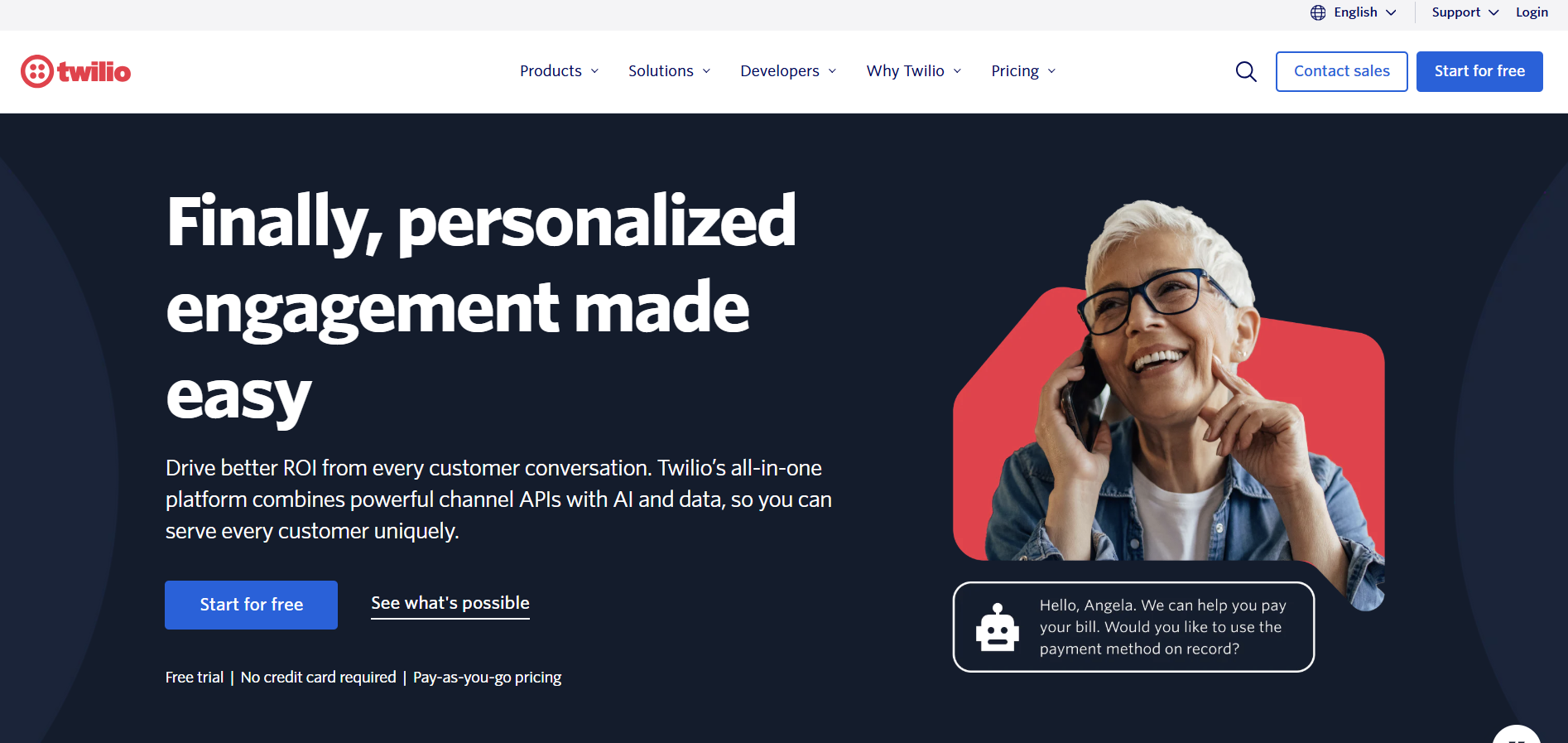
Best Twilio alternatives in 2025 are:
Vonage
MessageBird
Plivo
Sinch
Bandwidth
Telnyx
Nexmo
TextMagic
In today’s fast-paced world of communication, finding the right alternative to Twilio can give your business the tools it needs to stay connected—reliably, affordably, and at scale. Whether you're looking for advanced messaging APIs, smooth voice integration, or global coverage, there are plenty of options available to meet your needs. In this guide, we’ll dive into the best alternatives to Twilio, highlighting their unique features such as support programming languages, voice and video calls, call forwarding, and tools for managing customer interactions, and what they can offer your business.
Table of Contents
Why Do You Need Alternatives to Twilio?
As businesses expand their communication needs, relying solely on one provider can sometimes limit flexibility, drive up costs, or fall short on specific features when it comes to handling incoming messages, text messaging, and other communication tools. Alternatives to Twilio may offer more competitive pricing, specialized functionalities for managing customer data, improved integration with existing systems, or greater global coverage across various phone carriers. Evaluating different platforms ensures local businesses choose a solution that best aligns with their technical requirements and budget constraints.
Who Should Consider Using Twilio Alternatives?
Choosing an alternative to Twilio is a great choice for businesses and developers facing specific communication needs. Whether you're a developer in search of powerful API integrations, a business looking for budget-friendly global messaging, or an enterprise that needs dependable voice and SMS services, there’s a solution built for you. By understanding the unique advantages of each option, you can find the platform that best combines functionality, scalability, and cost-effectiveness for your goals.
Developers Needing Robust API Integrations
Developers who require extensive API capabilities for integrating messaging and voice services into applications will find platforms like Vonage and Plivo particularly attractive. These alternatives offer comprehensive documentation, flexible APIs, and tools that simplify the integration process.
Businesses Focused on Global Reach and Reliability
Companies that prioritize dependable global communications and competitive pricing should consider solutions such as MessageBird and Sinch. These platforms are known for their strong international infrastructure and high deliverability, making them ideal for businesses with a global customer base.
Small Businesses Seeking Cost-Effective Solutions
For startups and small businesses looking to optimize costs without compromising on quality, alternatives like Bandwidth and TextMagic provide affordable pricing plans along with user-friendly interfaces and essential communication features.
Enterprises Requiring Advanced Features
Large enterprises with complex communication needs may benefit from the advanced functionalities offered by Telnyx and Nexmo. These platforms provide enterprise-grade features, such as detailed analytics, scalable solutions, and high reliability, that are essential for robust business operations.
Twilio Alternatives Comparison Table
| Feature | Vonage | MessageBird | Plivo | Sinch | Bandwidth | Telnyx | Nexmo | TextMagic |
|---|---|---|---|---|---|---|---|---|
| Ease of Use | Moderate | Easy | Moderate | Easy | Moderate | Easy | Moderate | Easy |
| Pricing | Pay-as-you-go | Flexible Plans | Competitive | Pay-as-you-go | Competitive | Transparent | Free & Paid Plans | Affordable |
| Platform Support | Browser-based | Browser-based | Browser-based | Browser-based | Browser-based | Browser-based | Browser-based | Browser-based |
| API Capabilities | Extensive | Extensive | Moderate | Moderate | Moderate | Extensive | Extensive | Moderate |
| Special Features | Global Reach | Omnichannel Support | Cost-Effective Messaging | Integrated Voice & SMS | Carrier-Grade Network | Customizable Solutions | Real-Time Insights | User-Friendly Interface |
Best Twilio Alternatives
Finding the perfect alternative to Twilio can help streamline your communication services while meeting unique business needs. The following platforms offer a blend of robust APIs, competitive pricing, and specialized features designed for various use cases—from global messaging and voice calls to comprehensive analytics. Explore each option below to determine which solution aligns best with your operational requirements.
1. Vonage

Vonage provides a robust communication platform with a strong focus on voice, messaging, and video services. Designed for businesses that need reliable global connectivity, Vonage offers flexible APIs and competitive pricing, making it a strong contender for those looking to replace or complement Twilio.
Vonage vs Twilio
Vonage emphasizes seamless integration and global reach. With a focus on scalable voice and messaging solutions, it serves as an excellent alternative for businesses that need to deliver consistent communication services worldwide.
Key Features of Vonage
Comprehensive voice and SMS APIs
Global reach with robust connectivity
Advanced analytics and reporting
Scalable infrastructure for enterprise needs
Easy integration with multiple platforms
Vonage Pros
Strong global network coverage
Flexible and scalable API integrations
Competitive pricing for high-volume usage
Detailed analytics for improved performance
Reliable customer support
Vonage Cons
May have a steeper learning curve for beginners
Documentation can be complex for non-developers
Limited additional marketing features
Setup may require technical expertise
Regional pricing variations
Vonage Pricing
Vonage offers a variety of plans depending on the service type. For business communication, its VoIP plans start at $19.99 per user per month for the Mobile Plan, $29.99 for the Premium Plan, and $39.99 for the Advanced Plan, with discounts available for annual billing.
For APIs, Vonage follows a pay-as-you-go model. SMS starts at $0.007 per message, while voice calls begin at $0.015 per minute in the U.S., with additional charges for features like call recording or toll-free numbers.
2. MessageBird
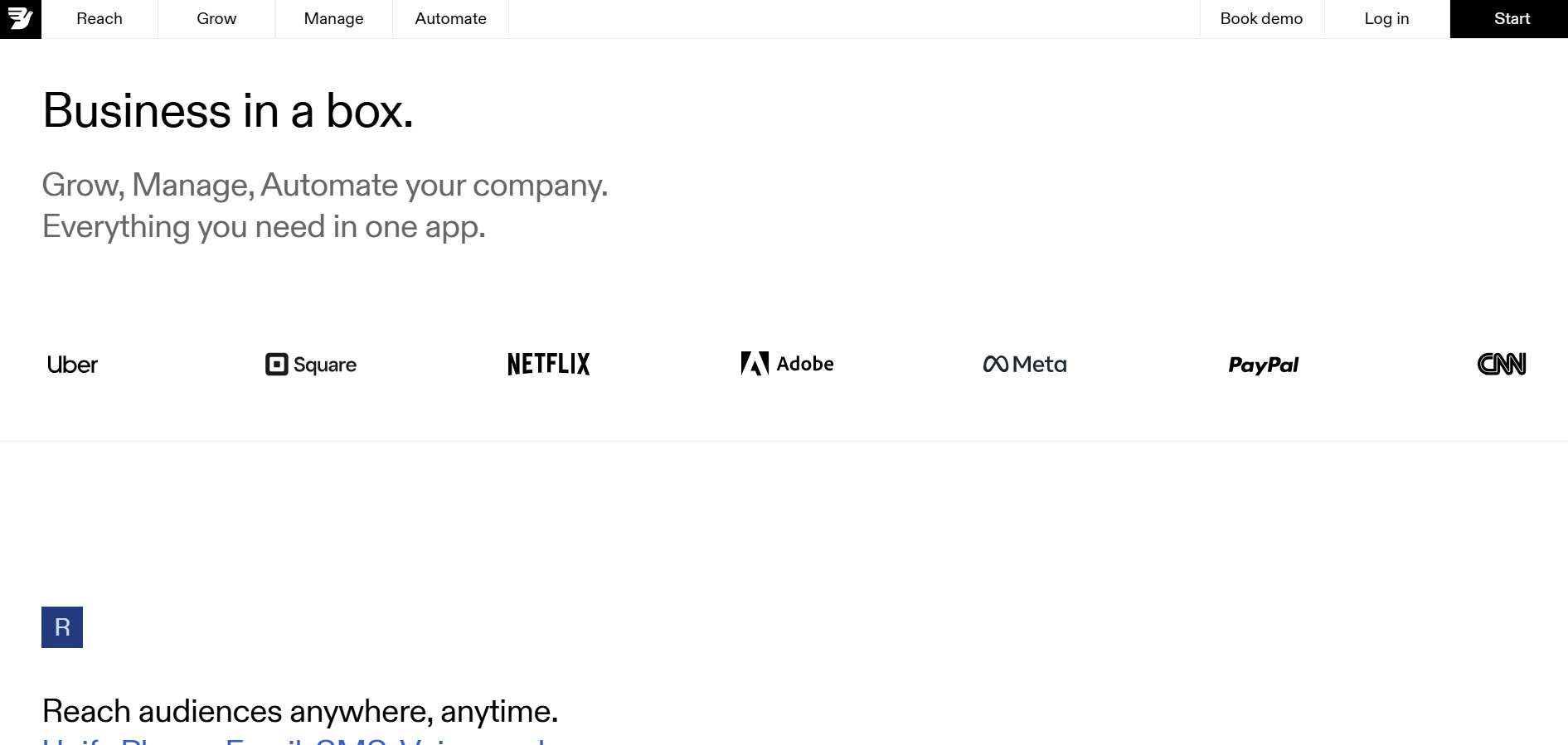
MessageBird is an omnichannel communication platform that excels in delivering seamless messaging, voice, and chat solutions across the globe. It is particularly well-suited for businesses that want to engage customers on multiple channels from a single API.
MessageBird vs Twilio
MessageBird offers a user-friendly interface and robust omnichannel capabilities that allow businesses to manage communications across SMS, voice, and chat. Its intuitive dashboard and comprehensive API make it a viable alternative to Twilio.
Key Features of MessageBird
Omnichannel messaging and voice APIs
User-friendly dashboard and interface
Real-time conversation management
Global connectivity and local compliance
Advanced routing and analytics
MessageBird Pros
Easy-to-use platform with intuitive design
Excellent global reach and regulatory compliance
Quick integration and robust documentation
Strong customer support and onboarding
Versatile solutions for multiple channels
MessageBird Cons
Pricing can be higher for low-volume users
Some advanced features may require premium plans
Limited customization compared to some competitors
Occasional delays in message delivery reported
Interface may be overwhelming for new users
MessageBird Pricing
MessageBird uses a flexible pricing model based on usage and channels. SMS costs start at $0.008 per message in the U.S., while voice calls are billed at $0.006 per minute for outbound and $0.0033 per minute for inbound calls.
WhatsApp API plans begin at $50 per month for Essentials, $150 per month for Pro, and custom pricing for Enterprise use cases. Additional charges apply for features like dedicated numbers and short codes.
3. Plivo
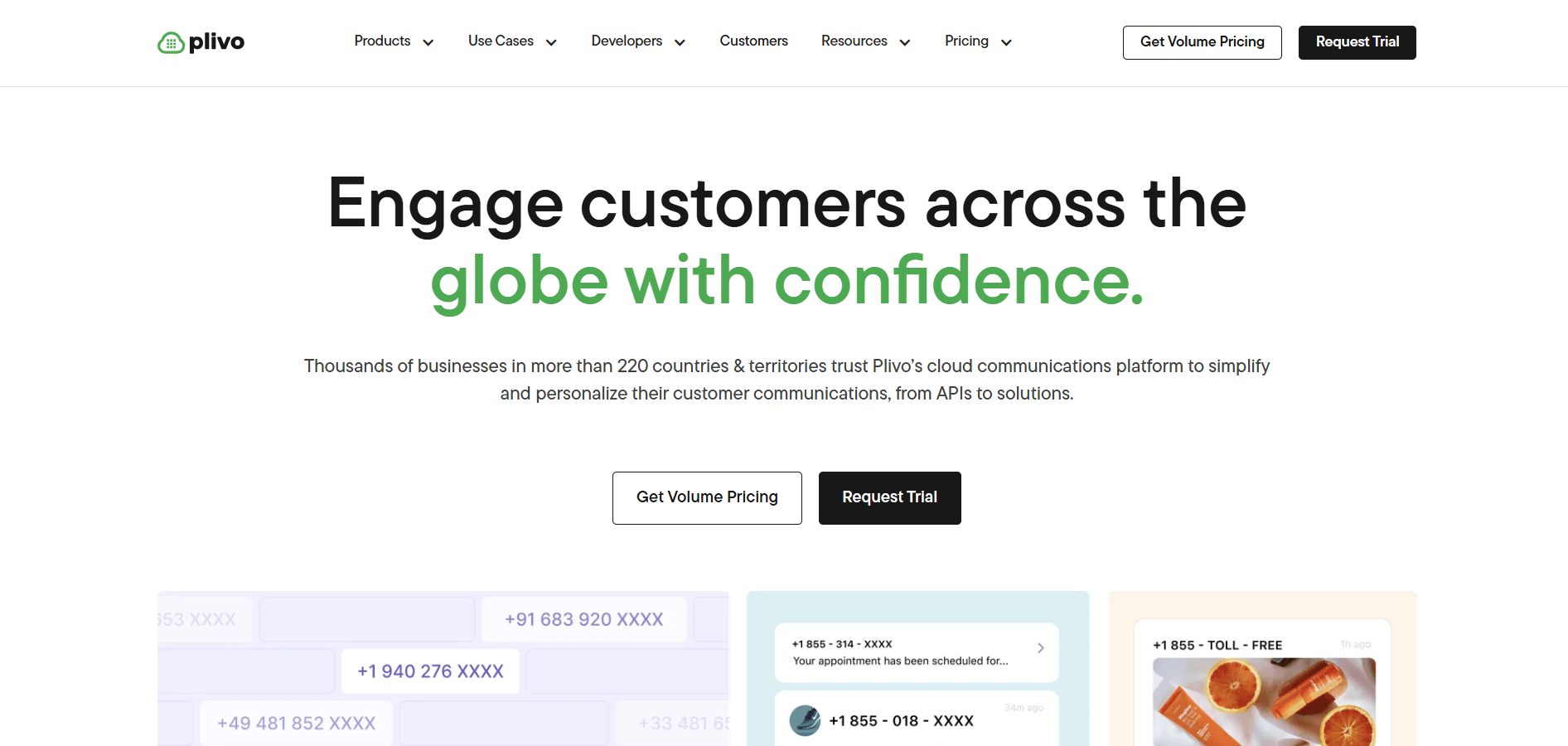
Plivo provides a cost-effective and developer-friendly platform for voice and messaging services. It focuses on simplicity and scalability, making it ideal for businesses that require reliable communications without a steep price tag.
Plivo vs Twilio
Plivo delivers competitive pricing and an easy-to-integrate API, positioning itself as an attractive alternative for businesses that need a balance between functionality and cost efficiency.
Key Features of Plivo
Developer-centric voice and SMS APIs
Global SMS and voice connectivity
Comprehensive call analytics and reporting
Reliable infrastructure with high uptime
Scalable for both small and large businesses
Plivo Pros
Competitive pricing and flexible plans
Straightforward API integration and excellent documentation
High deliverability for global communications
Transparent pricing with no hidden fees
Good customer support
Plivo Cons
Fewer advanced features compared to larger competitors
Limited omnichannel support beyond voice and SMS
Basic dashboard and reporting tools
May require technical expertise for optimal use
Occasional latency issues in certain regions
Plivo Pricing
Plivo provides competitive pricing with SMS starting at $0.005 per message in the U.S., and voice call rates beginning at $0.013 per minute for outbound calls and $0.0085 per minute for inbound calls. Plivo also offers pay-as-you-go pricing with volume discounts and enterprise-grade features like dedicated short codes and phone numbers available at additional costs.
4. Sinch
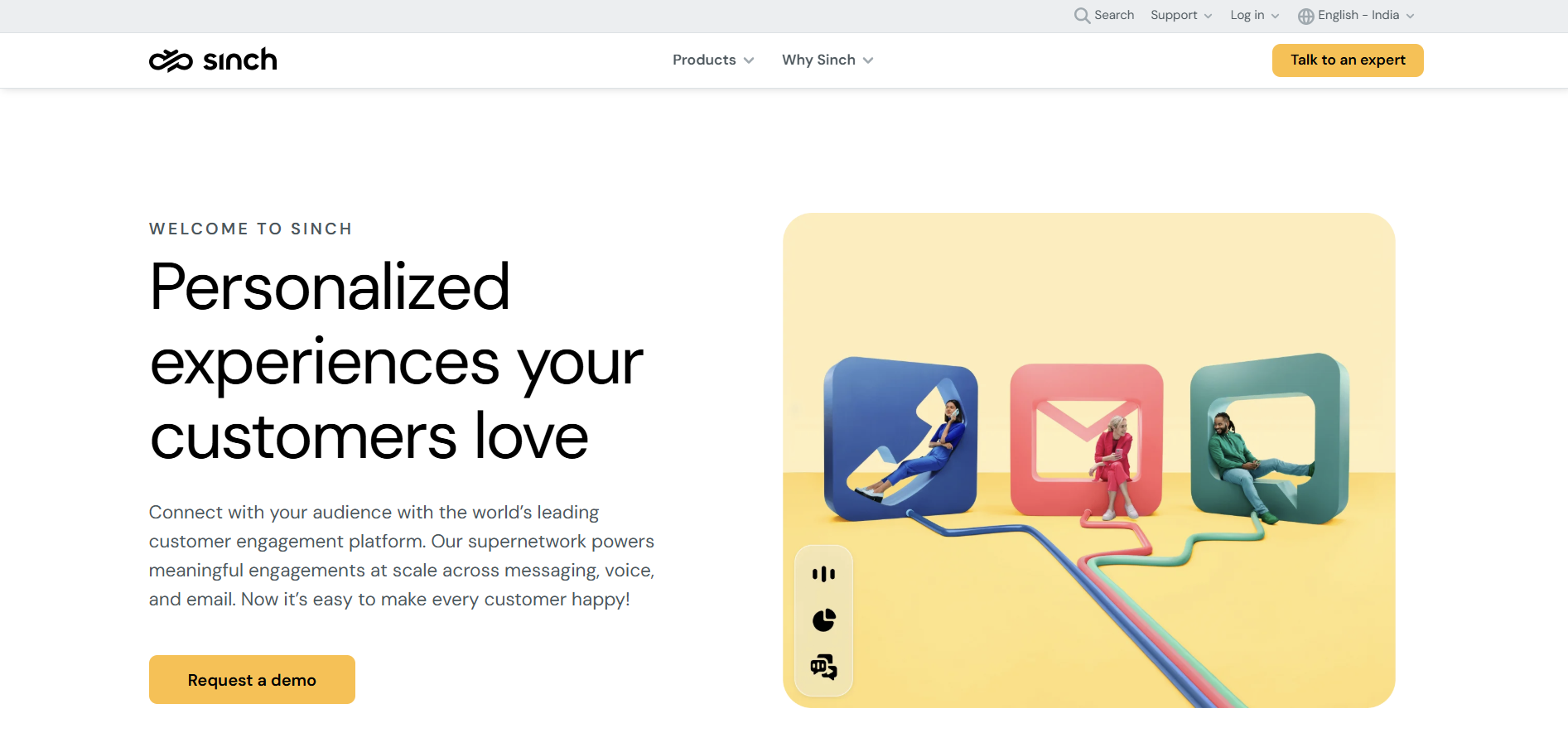
Sinch is a comprehensive communication platform that offers powerful messaging, voice, and video APIs. It is known for its strong focus on mobile engagement and high deliverability rates, making it an excellent alternative for businesses targeting mobile users.
Sinch vs Twilio
Sinch emphasizes mobile-first communication and robust API performance. Its platform is designed to deliver reliable messaging and voice solutions, particularly for mobile-centric applications.
Key Features of Sinch
SMS, voice, and video APIs
High deliverability and mobile optimization
Real-time analytics and tracking
Global connectivity with local compliance
Easy integration with mobile apps
Sinch Pros
Excellent performance for mobile messaging
Strong global infrastructure and high deliverability
User-friendly API integration
Comprehensive analytics and reporting tools
Competitive pricing for mobile-focused services
Sinch Cons
May not offer as many advanced features as some competitors
Pricing complexity for international routes
Limited additional marketing tools
Setup can be challenging for non-developers
Customer support may vary by region
Sinch Pricing
Sinch offers pay-as-you-go pricing for SMS and voice services. SMS costs start at $0.0078 per message for outbound and inbound messages in the U.S., with international rates varying by region. Voice calls are priced at $0.005 per minute for app-to-app calling and $0.01 per minute for app-to-phone calls. Sinch also provides free inbound SMS on both long codes and short codes, along with volume discounts for high usage.
5. Bandwidth
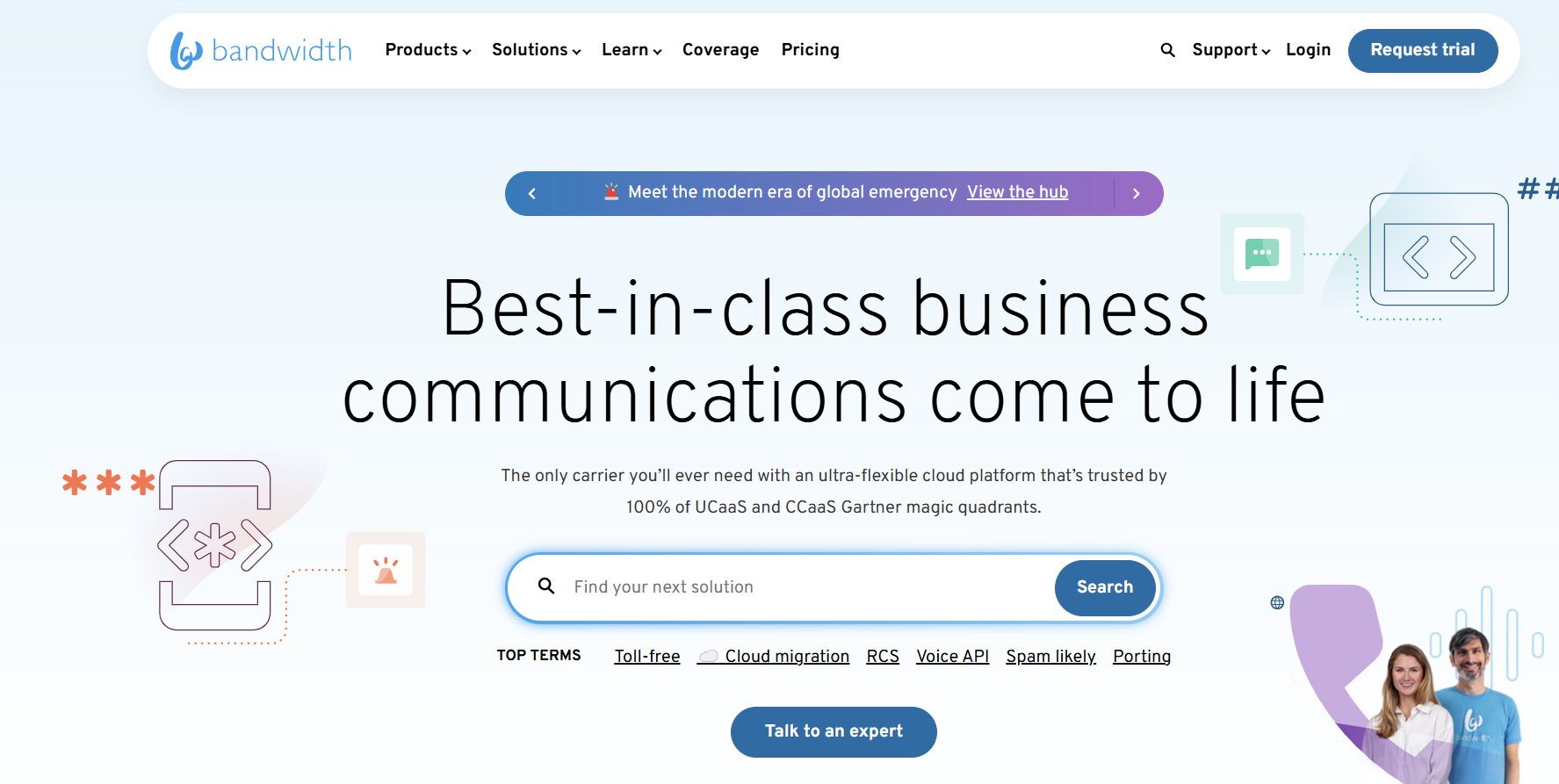
Bandwidth is a robust communications platform that emphasizes carrier-grade voice and messaging services. It is ideal for businesses that require direct access to the network and transparent pricing structures.
Bandwidth vs Twilio
Bandwidth distinguishes itself by offering direct-to-carrier connectivity, which can result in improved call quality and lower latency. This makes it a strong alternative for enterprises that demand high reliability and granular control over their communication services.
Key Features of Bandwidth
Direct-to-carrier connectivity
High-quality voice and messaging APIs
Detailed call and message analytics
Transparent pricing with no middleman fees
Scalable solutions for enterprise-level needs
Bandwidth Pros
Superior call quality and low latency
Transparent, competitive pricing
Robust infrastructure with carrier-level reliability
Extensive analytics and reporting features
Excellent for high-volume enterprise use
Bandwidth Cons
May be more complex to set up than cloud-based solutions
Limited global reach compared to some competitors
Fewer marketing-oriented features
Requires technical expertise for integration
Higher initial setup costs for smaller businesses
Bandwidth Pricing
Bandwidth pricing depends on the type of service and usage volume. SMS costs range from $0.004 to $0.0185 per message, with discounts available for high volumes. Bandwidth also provides voice services, but specific rates are not publicly listed and require a custom quote based on business needs. On average, businesses spend approximately $35,000 annually on Bandwidth services, with enterprise contracts reaching up to $100,000.
6. Telnyx
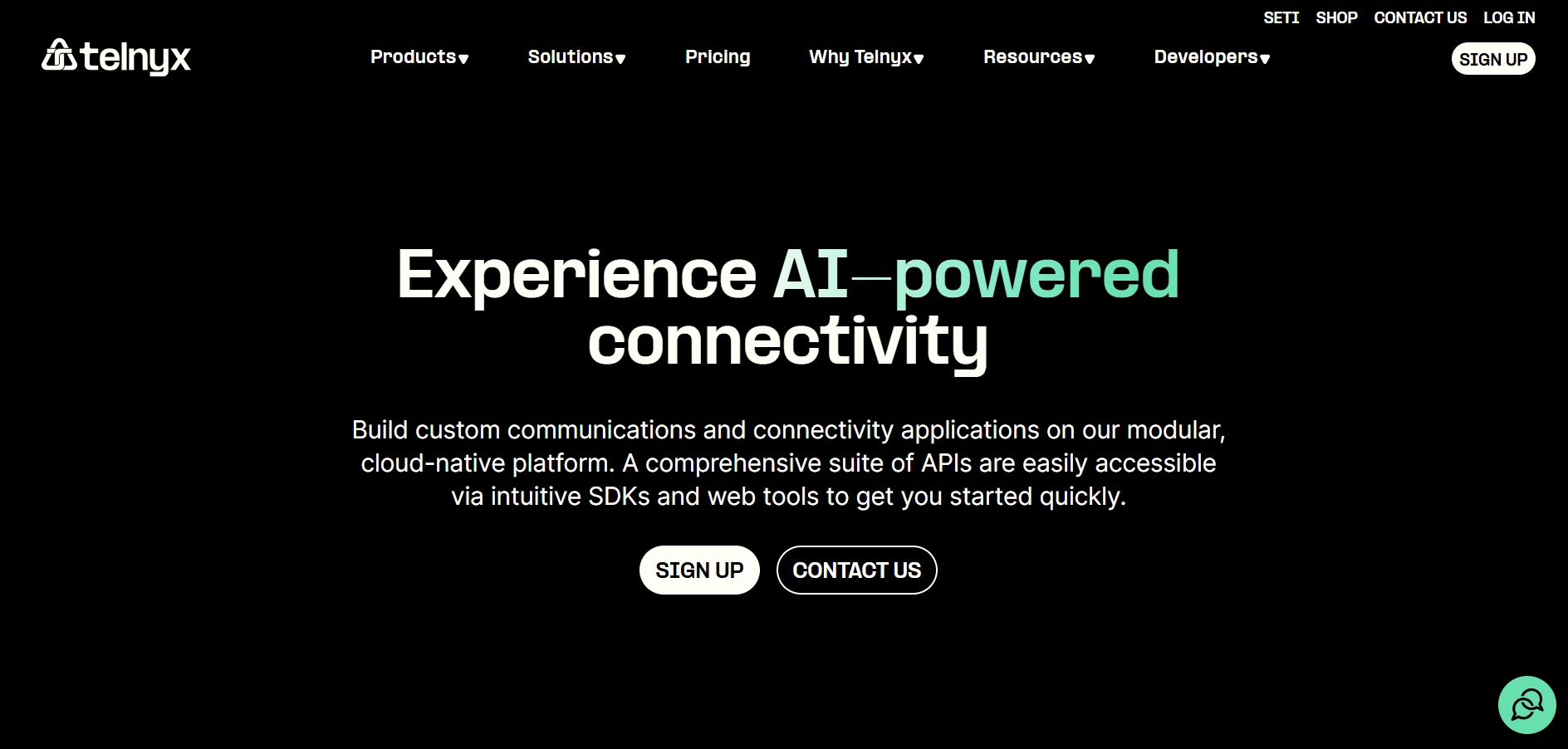
Telnyx is a modern communication platform that offers flexible APIs for voice, messaging, and more. It is designed for businesses that need advanced customization options and high reliability, with a focus on transparency and developer-friendliness.
Telnyx vs Twilio
Telnyx stands out with its transparent pricing, robust API features, and strong focus on network quality. Its platform is ideal for businesses that require granular control over their communications and appreciate flexible, usage-based billing.
Key Features of Telnyx
Powerful voice and SMS APIs
Transparent, usage-based pricing
Customizable and scalable infrastructure
Global connectivity with high-quality network routes
Advanced developer tools and analytics
Telnyx Pros
Transparent and competitive pricing
High-quality network performance
Developer-friendly with extensive documentation
Flexible and scalable API solutions
Excellent customer service and support
Telnyx Cons
Interface and setup may be complex for beginners
Fewer out-of-the-box marketing features
Limited omnichannel support beyond voice and SMS
Advanced features may require additional configuration
Not as widely adopted as some larger competitors
Telnyx Pricing
Telnyx uses a pay-as-you-go model with competitive rates. SMS starts at $0.0025 per message in the U.S., while voice calls begin at $0.007 per minute for outbound calls and $0.0035 per minute for inbound calls. Telnyx also offers additional features like messaging profiles, call recording, and SIP trunking at affordable rates, with volume discounts for larger usage.
7. Nexmo
Nexmo, now part of Vonage, provides a comprehensive suite of communication APIs for messaging, voice, and phone verifications. Its platform is designed to simplify global communications, making it a popular alternative for businesses seeking an easy-to-integrate solution.
Nexmo vs Twilio
Nexmo offers a balance of robust API capabilities and ease of use. With a focus on global messaging and voice services, it is well-suited for businesses that need reliable and scalable communication solutions across multiple channels.
If communication challenges are slowing you down, exploring Zapier alternatives can help you streamline integrations and improve efficiency.
Key Features of Nexmo
Global voice and SMS APIs
Simple integration and robust documentation
Real-time insights and analytics
Support for phone verifications and two-factor authentication
Competitive pricing and flexible plans
Nexmo Pros
User-friendly platform with quick onboarding
Reliable global connectivity
Comprehensive API documentation
Competitive pricing models
Versatile functionality for multiple communication channels
Nexmo Cons
Fewer advanced customization options compared to some competitors
Limited additional marketing features
May require additional integration for full omnichannel support
Occasional variability in international performance
Customer support may be slower during high-demand periods
Nexmo Pricing
Nexmo (Vonage API) follows a similar pay-as-you-go structure. SMS costs start at $0.0065 per message in the U.S., while voice calls are billed at $0.013 per minute for outbound calls and $0.0065 per minute for inbound calls. Additional services like WhatsApp messaging or two-factor authentication APIs incur separate charges.
8. TextMagic
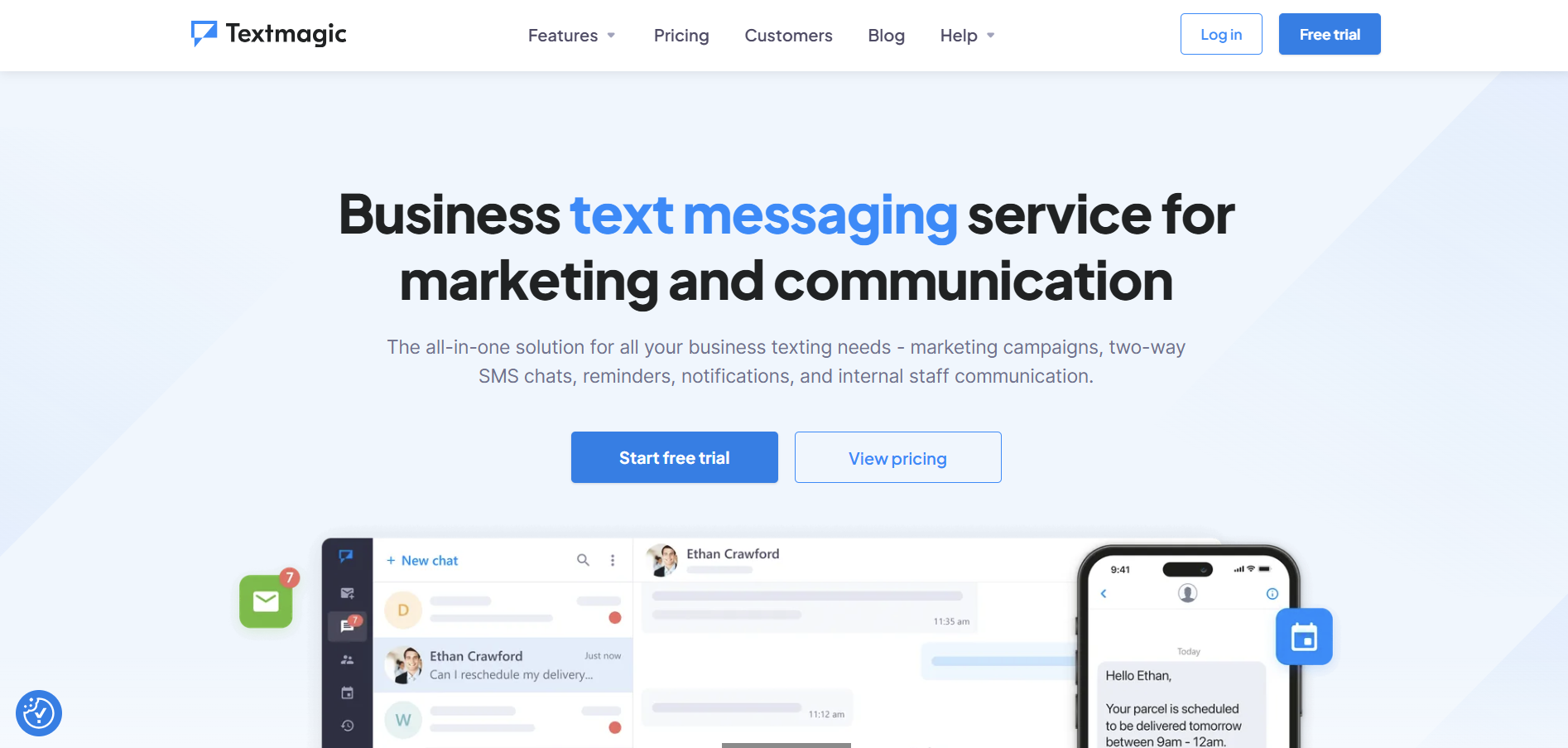
TextMagic is a user-friendly messaging platform designed primarily for business communication. It offers SMS solutions that are simple to deploy and manage, making it an excellent choice for small to medium-sized businesses looking for straightforward, effective messaging services.
TextMagic vs Twilio
TextMagic focuses on ease of use and affordability, providing a streamlined platform for sending bulk SMS and transactional messages. Its intuitive interface and simple pricing model make it a practical alternative for businesses that do not require the extensive features offered by larger platforms.
Key Features of TextMagic
Bulk SMS and transactional messaging
User-friendly web-based interface
Easy contact management and scheduling
Detailed message tracking and reporting
Integration with various business tools
TextMagic Pros
Extremely user-friendly and quick to set up
Affordable pricing suitable for small businesses
No complex API integration required
Reliable SMS delivery with tracking features
Excellent for marketing and customer notifications
TextMagic Cons
Limited to SMS services with fewer voice or video options
Basic analytics compared to larger platforms
Fewer customization options for advanced users
Not ideal for high-volume, enterprise-level messaging
Limited API features for deep integrations
TextMagic Pricing
TextMagic offers flexible pricing plans to cater to various business needs. The Essential Plan is pay-as-you-go, starting at $24.50 for 500 texts, ideal for occasional messaging or one-time campaigns, with credits that never expire. The Professional Plan starts at $80 per month for 2,000 texts and includes features like a free virtual number, free inbound texts, and rollover credits for up to two months.
For high-volume users, the Connect Plan begins at $100 per month for 10,000 texts and allows integration with third-party providers like Twilio or Vonage while using TextMagic’s platform. Virtual numbers cost an additional $4–$10 per month depending on the country. A free trial is available for testing the platform before committing to a plan.
FAQs on Twilio Alternatives
1. What are the top alternatives to Twilio?
The top alternatives to Twilio include Vonage, MessageBird, Plivo, Sinch, Bandwidth, Telnyx, Nexmo, and TextMagic. These platforms offer various features for voice, SMS, and other communication services, catering to diverse business needs.
2. Why should I consider using an alternative to Twilio?
You should consider an alternative to Twilio if you require more competitive pricing, enhanced global reach, specialized features, or better integration with your existing systems. Evaluating multiple providers helps ensure you select a platform that aligns with your technical requirements and budget.
3. Are Twilio alternatives cost-effective?
Yes, many Twilio alternatives offer competitive pay-as-you-go pricing, volume discounts, and flexible plans designed to meet the needs of small businesses to large enterprises. Each platform’s pricing model is structured to provide value based on usage and specific service requirements.
4. Which Twilio alternative is best for developers?
For developers, platforms like Vonage, Plivo, and Telnyx offer robust API integrations, detailed documentation, and developer-friendly tools that simplify the integration process, making them excellent choices for technical teams.
5. Can I use these alternatives for both voice and messaging services?
Absolutely. Most Twilio alternatives provide comprehensive APIs for both voice and messaging services. Platforms such as MessageBird, Sinch, and Nexmo are designed to handle omnichannel communications, ensuring seamless integration across multiple channels.